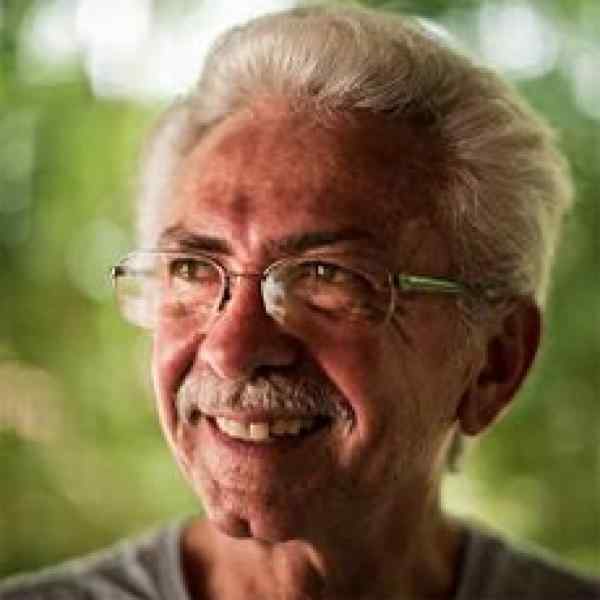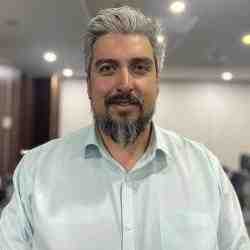Introduction
Luiz Geraldo de Oliveira Moura is offering Brazil's small farmers an alternative way of growing and selling produce that guarantees their livelihood while protecting the environment. By helping them convert to organic farming and linking them directly with consumers, he is transforming an important agricultural sector and offering all consumers, even the poor, a healthy, low-cost food alternative.
The New Idea
Moura is using organic agriculture to encourage a more environmentally, economically, and socially sustainable relationship among consumers, producers, and the land they all depend on. This approach goes beyond the organic food cooperative model employed on a small scale around the world. It does not depend solely on the consumer's altruistic willingness to pay more to "eat green," but rather creates incentives for consumers and producers alike. Moura puts supply and demand together in a system that gives farmers advance payment, guaranteeing income throughout the year, and gives the consumer high-quality organic produce at a fixed and affordable price. The plan begins by training small farmers how to use organic farming technology to convert their land quickly and cost-effectively, emphasizing environmental protection, long-term sustainability, and a harmonious relationship with the land. The next step brings consumers closer to producers by educating them about the vulnerability of small farmers who produce for the open market and asking them to put a value on the products they want to see on their table each month. The farmers are offered a guaranteed, fair price for their produce, and also gain technical training to make their farms environmentally sustainable.
The Problem
Traditional agriculture is an important livelihood for many families in the semi-arid northeast of Brazil. Small family farms are actually responsible for providing 85 percent of the food that arrives on Brazilian tables. Despite the importance of this supply, family farmers have found themselves trapped in a vicious circle that arises from the adoption of modern, high-intensity farming methods. The postwar Green Revolution transformed agriculture in northeast Brazil by introducing hybrid crop varieties that produce higher yields but require expensive pesticides, fertilizers, and other agro-chemicals. Lack of crop rotation and the cultivation of unsuitable lands have led to loss of soil fertility, higher susceptibility to erosion, and desertification. In fact, although farmers are seen as producers, they are increasingly being turned into consumers themselves, dependent on hybrid seeds, pesticides, and fertilizers they must purchase to survive. Official policies have encouraged environmental degradation by indiscriminately permitting untilled land to be put in production without ensuring its sustainable use. Small farmers have not yet taken advantage of the potential of organic agriculture to create an environmentally, economically, and socially sustainable system of production. The few efforts to grow food organically have been undertaken mainly for economic reasons: large farmers set aside a small portion of their land for organic production because they can charge double the market price for something bearing an "organic" label. The result is that organic products remain a luxury, beyond the reach of most consumers, who eat food loaded with health-compromising chemicals and additives.
The Strategy
Moura has created Agriculture in Partnership with the Citizen, a system that binds farmers and consumers in an economic relationship based on a commitment by both sides. The consumers participate in creating a production plan, deciding what varieties of products they require and how much they typically consume in a week, month, and year. They then contribute a monthly fee that is one-twelfth of the total projected cost for the year's production, and in return have the right to receive a weekly basket of fruit, vegetables, poultry, dairy products, and other edibles. The farmer promises to grow these products organically, without agro-chemicals, hormones, antibiotics, or other synthetic chemicals. Each participant is responsible for improving the lives of the other, ensuring a line of production that is free of middlemen and price fluctuations, and that guarantees a fair monthly income for the producer. Moura developed this system through the work of the Center for Learning and Applied Studies (Núcleo de Ensino e Pesquisa Aplicada, or NEPA), which he and his colleagues founded to address environmental degradation and the vulnerability of small-farmers in the state of Ceará. He started by devising the "landscape methodology" for training farmers about environmental recovery and organic production. First, he and a team member offer training for farmers who are interested in converting their system of production. As model farms Moura selects properties that have the infrastructure for producing a range of products throughout the year. Each model farm forms a cell, bringing together up to thirty participants including men, women, and youth. To prepare a property for conversion requires forty hours of initial training, provided in eight-to-twelve-hour sessions, with twenty-four additional hours for providing support and follow-up. During each meeting, participants discuss the theoretical concepts and practical actions for converting to organic farming. Each participant then implements the techniques and discusses any problems at the next meeting. NEPA carries out these trainings throughout the year, to address problems related to seasonal changes or growth cycles. The conversion of properties to organic production creates "islands of fertility," as Moura calls them, which bit by bit are helping to recuperate the richness of the land. On average, each group of thirty participants results in the conversion of three farms to organic production. Consumers are organized in a similar way. At meetings in urban areas, they learn about the benefits of purchasing organic products directly from small producers. Those who are interested in participating form groups that meet to discuss the products they want, collaborate on a growing plan for the year, and agree on pricing for the year's production. A consumer education program encourages environmental awareness, offers information about healthy eating, and arranges visits to the farm that is growing the food. The groups are organized under the Association for the Development of Organic Farming (ADAO), which was established with the first group of twenty-eight consumers in 1996.The response to Moura's approach has improved greatly each year. During the first year, Moura and his team helped three families convert to organic production in a National Institute of Colonization and Agrarian Reform (Instituto Nacional de Colonização e Reforma Agrária or INCRA) settlement that contained forty-nine agricultural families in three communities with a total of three hundred participants. At a second INCRA settlement, the following year, four out of seventeen families converted to organic production, bringing the total number of participants to three hundred fifty and the number of converted properties to eighteen. During 1999, the eight hundred sixty-three participants included forty-two organic producers, in two more INCRA settlements. The year 2000 saw two thousand growers register for participation in conversion.Moura has implemented similar programs in other states, such as São Paulo and Goiás, and is helping organize farmers in Bahia, Rio Grande do Norte, Paraná, Santa Catarina and Rio Grande do Sul. He has been invited to conferences to present his model for organic conversion and the establishment of ADAO groups to provide markets. He is exploring the possibility of replicating his model through the Association of Organic Agriculturists in Brazil, which includes four hundred growers.Moura is ready to take his approach to the mass-market level. He is negotiating partnerships with traditional food distribution channels like supermarket chains. Moura offers these companies high-quality organic products that are inexpensive, healthful, and have an environmental and social cachet. In return, the supermarket agrees to certify the products of ADAO farmers and to set prices low enough to increase consumption and keep products accessible to low-income consumers. The conditions of association also stipulate how to market the product in order to increase consumer awareness, attract new consumers, particularly less affluent ones, and use ecologically sound packaging. Increased sales and the burnishing of the corporate image make the agreement attractive to the company and create a market for the growing number of producers wanting to convert to organic production. Moura is also planning to establish an organization to educate citizens about the economic and social benefits of the ADAO program and attract more consumers.
The Person
Luiz Geraldo de Oliveira Moura had a childhood filled with curiosity and experimentation. Raised by a working single mother and supported by a dedicated godmother, Moura was four years old when he met his new stepfather, who instilled in him a sense of ethics and honesty and opened up opportunities to visit his grandparents in the distant caatinga, the dry prairie. There Moura began to learn about life on a farm, the richness of nature, and respect for the land. He brought this appreciation back with him to his own neighborhood, where he set up a primitive biology laboratory and aeronautical club, which he named the Cearenese Air Force, using instruments donated by a neighbor. These early beginnings led to years of study and experimentation, always aimed at using technology and science to foster positive social change. At age twenty, Moura became the youngest member of the technical team of a Swiss company, Erikkson, and traveled all over Brazil, where he learned about different ecosystems.Moura left the company in 1991 and entered veterinary school. A year later he and a colleague informally established NEPA to direct technological and scientific information to benefit rural communities, and in 1996 they officially launched the organization with Moura as president.




